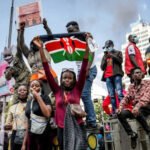The elderly have suffered in unique ways from the Boko Haram insurgency that has devastated individuals and communities across northeast Nigeria for almost a decade, Amnesty International (AI) said in a research report.
In the 67-page report, which was published in December 2020, the global rights defender noted elderlies’ experience of the conflict, displacement, and detention.
AI cited instances when many elderlies starved or were killed in their homes or left to languish and die in squalid, unlawful military detention.
Also, the report, titled, My Heart Is In Pain: Older people’s experience of conflict, displacement, and detention in Northeast Nigeria, focused on how displaced elderly people were overlooked by the humanitarian response.
Development Diaries gathered that the study was conducted between November 2019 and October 2020 in the northeastern states of Borno and Adamawa, including Michika and Madagali local government areas, and Nigeria’s capital, Abuja.
As a result of the Boko Haram insurgency, over two million people, including around 150,000 elderlies are displaced, according to the United Nations High Commissioner for Refugees (UNHCR).
The scourge of the crisis, according to the report, is also more severe for the elderly due to the mobility impairment that comes with old age as they are usually the last to flee from armed group attacks, leaving them vulnerable to being killed.
‘When Boko Haram has invaded towns and villages, older men and women have often been among the last to flee, leaving them particularly exposed to the armed group’s brutality and repression – amounting to war crimes and likely crimes against humanity’, said AI Director of Crisis Response Joanne Mariner.
‘This has included torture, being forced to witness killings and abductions of their children, as well as looting, resulting in extreme food insecurity’.
Many elderlies are also reportedly being held unlawfully in detention by the military for simply being related to alleged Boko Haram members.
‘Thousands of older people have been denied dignity in hellish conditions in military detention, with many hundreds of them dying in squalor’, Mariner added.
‘These, too, amount to war crimes and potentially crimes against humanity’.
AI said it interviewed elderly people from 17 camps across Borno State and none of them had received targeted assistance.
According to the report, some elderly people reported having to beg just to have enough food and medicine to survive. Others said they were forced to go without essential medication.
‘Many older women in particular face further challenges as they care for grandchildren whose parents were killed, abducted, or detained by Boko Haram or the Nigerian military’, it noted.
‘Gender discrimination and patriarchal norms in northeast Nigeria pose additional barriers to older women’s participation in processes that impact their lives.
‘Nobody is hearing us, nobody is seeing us’, one older woman told the organisation, according to the report.
AI called for elderly people to be fully included in the design and implementation of humanitarian programmes.
‘Humanitarian agencies estimate that older people account for around 150,000 of the 2.1 million people displaced by the conflict in northeast Nigeria’, the report noted.
‘In displacement camps, the failure to ensure that humanitarian aid is adequate and reaches some of the most at-risk people, including older people, has led to the violation of their human rights’.
Boko Haram was established in 2002 as a religious movement with a vision of reforming society based on its interpretation of Islam.
The Boko Haram insurgency began in 2009, when the Nigerian security forces arrested several members of the group, also known as Jama’atu Ahlis Sunna Lidda’awati wal-Jihad (JAS), and extrajudicially executed its leader, Mohammed Yusuf.
Source: Amnesty International
Photo source: UNAMID






